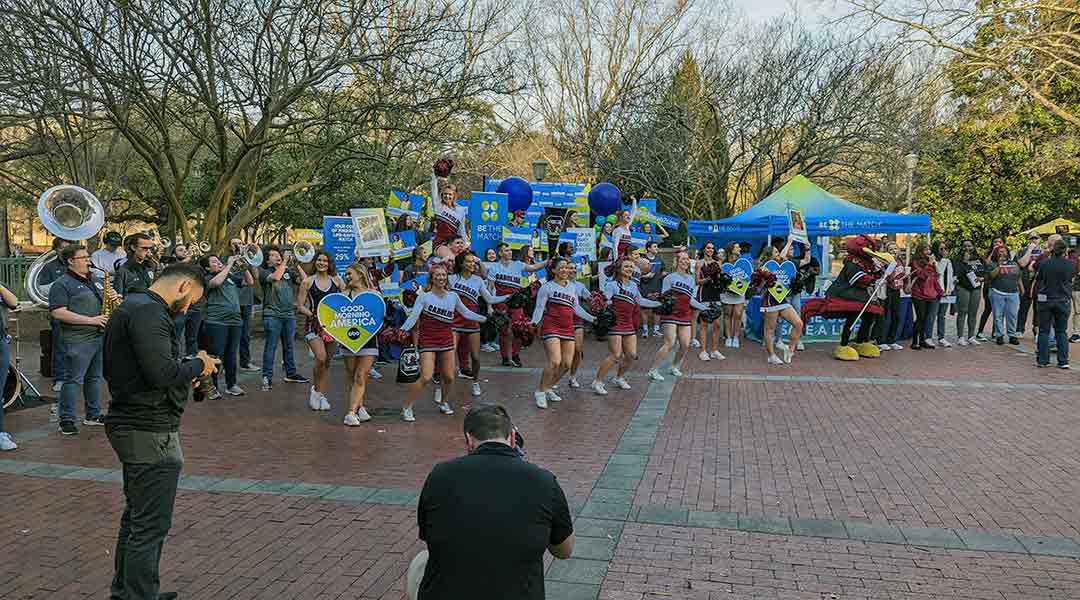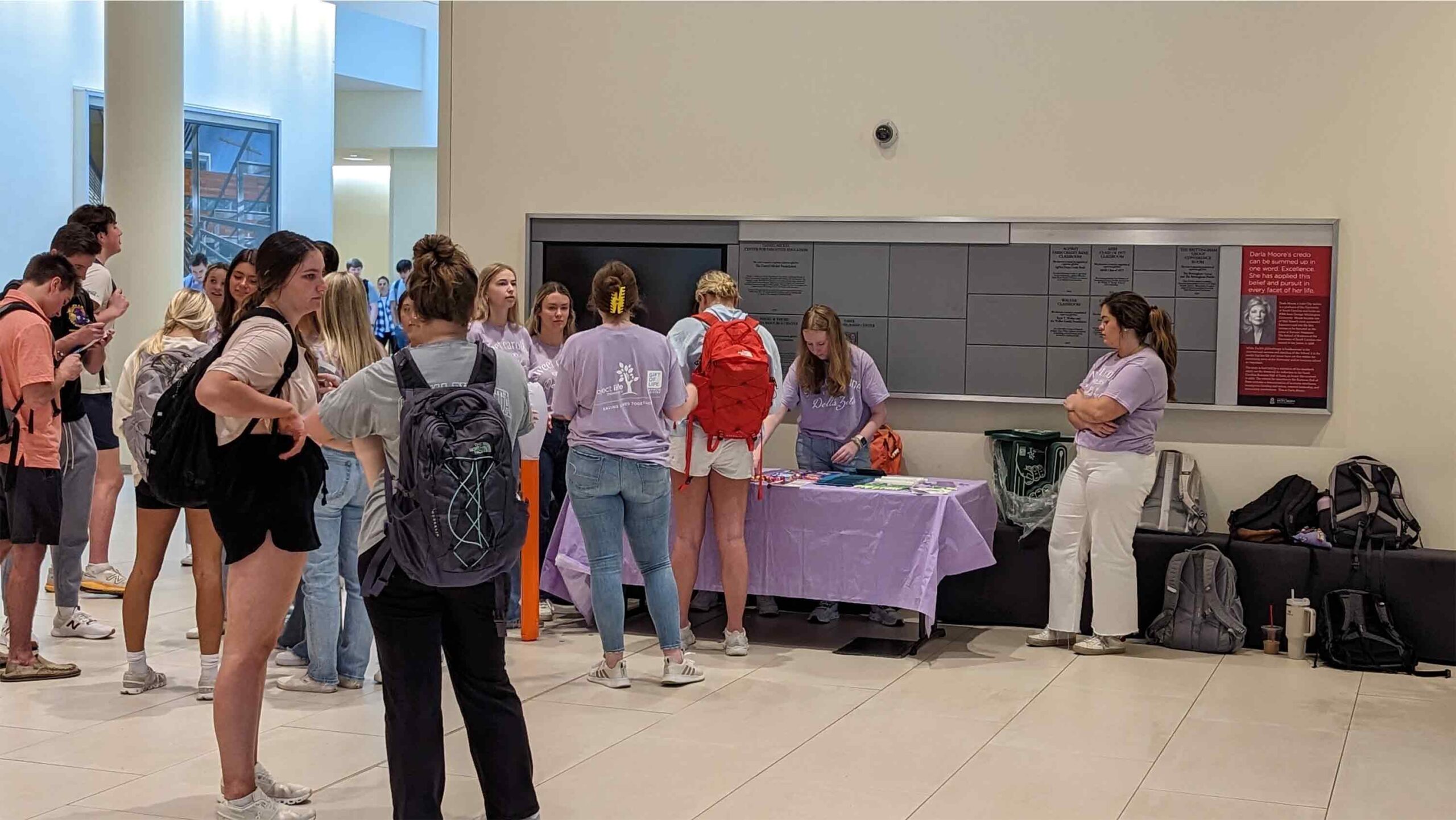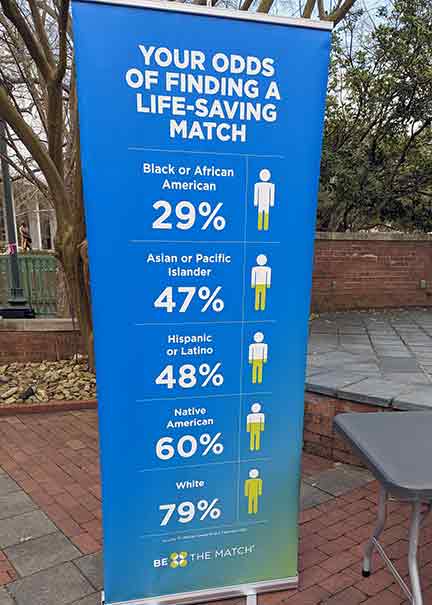The University of South Carolina pulled out all the stops to support the Be The Match student organization. Cheerleaders and the Carolina band perform for the Good Morning America cameras next to the organization’s tent. (Photos by Noah Hale)
The Russell House patio was more crowded than usual that morning.
Students on the way to class mingled with the Carolina band playing the school’s fight song, cheerleaders performing and Cocky playing air guitar on an oversized cotton swab.
The scene likely raised some eyebrows.
A camera crew for Good Morning America and signs for USC’s chapter of Be The Match might have explained the commotion.
Be The Match is dedicated to expanding the national stem cell and bone marrow donor registry, which pairs donors with people in need.
USC partnered with four other universities for the ABC morning show’s Feb. 21 “One Match, Second Chance” event. The idea was to honor anchor Robin Roberts, who received a bone marrow transplant for myelodysplastic syndrome 10 years ago.
The broadcast marked the 10th anniversary of her return to GMA.
“I was really grateful to be able to say once again ‘Good Morning America’ – and hopeful that by being back I could somehow be a symbol to others going through something that ‘this too shall pass,'” Roberts told viewers.
The show also featured Duke, Howard, Villanova and Hofstra universities.
Part of the festivities around the Russell House was a Be The Match table where spectators could sign up for the registry.
A DJ played between live shots from GMA.
The main guest of honor? Gamecocks head women’s basketball coach Dawn Staley.
“This is very personal to me,” Staley said on camera. “My sister was diagnosed three years ago with leukemia. All of our siblings got tested, and my brother was a perfect match. … Lawrence gave my sister the gift of life (and) gave our family peace of mind.”
Staley was joined by a young girl from Columbia who is suffering from aplastic anemia and has yet to find a match in the registry.
Staley spoke with the girl and gave her a gift bag that included a signed basketball and a national championship ring.
Patients are not likely to find a match within their family, said Amy Schatz, account manager for Be The Match for Virginia and the Carolinas.
Only about 30% of patients find a match within their family.
Be The Match also is trying to add more diversity to the registry, in part because patients are more likely to find a match from someone of the same ethnicity.
Transplant, or stem cell treatments, replace damaged cells that help the body perform vital functions such as fighting diseases.
“If you’re white, you have a pretty good chance (of finding a match),” said Maeve Kelley, president of USC’s Be The Match chapter. “If you’re not, not so much. So we’re trying to fix that.”
The USC chapter was dormant before Kelley’s first year at the university.
She and a roommate knew it was an organization they wanted to restart.
“I have a cousin who, when he was 11, was diagnosed with leukemia,” she said. “He ended up going into remission, and everything, without the use of a blood donor. But that’s how I became exposed to the need for donors to treat things, like leukemia and other blood-based diseases.”
Among those in the crowd that morning was freshman Sydney Zulywitz, who just a week earlier had donated stem cells to someone she was matched with in the registry.
“I felt really lucky to have been able to do that,” she said. “I mean, a lot of people have said, ‘Oh, that is so cool.’ My mom has been hyping me up like, ‘Oh, you’re a hero.’ But I just think it’s so cool that, of all people, I got to do that.”
Be The Match isn’t the only organization on campus that aims to expand the registry.
Across the sidewalk for a three-day event were members of Delta Zeta sorority, clad in purple and sometimes joined by their giant turtle mascot.
Delta Zeta has worked the Sweet Caroline drive since 2005, when a sorority sister, Caroline Terry, passed away after her fight with leukemia. Sweet Caroline has been partnered with Project Life, another registry advocacy group, for the past three years.
The current vice president of philanthropy for Delta Zeta, Ali Galante, has worked closely with Project Life the past two years.
“They’ve helped us get enticing things like (snacks) to give out to people,” she said. “And (they) just really have helped my understanding of what we’re doing so that I can help educate our chapter on what being part of the registry really means.”
The two organizations, while both advocating for the same cause at the same time, are not affiliated.
“At the end of the day, we’re all just trying to add names to the same national registry,” Galante said. “And we had a very successful day. … We were able to add over 700 names to the registry list. … It was just really exciting.”
USC’s chapter of Delta Zeta held its own Sweet Caroline registry drive. Although the two drives are unaffiliated, they advocate for the same cause. Both groups had tables across campus, including one on the first floor of the Darla Moore School of Business.
Be The Match was advocating for ethnically diversifying the registry for bone marrow donors. People who are 18-35 years old are more likely to be a match for patients in need, one advocate said.




